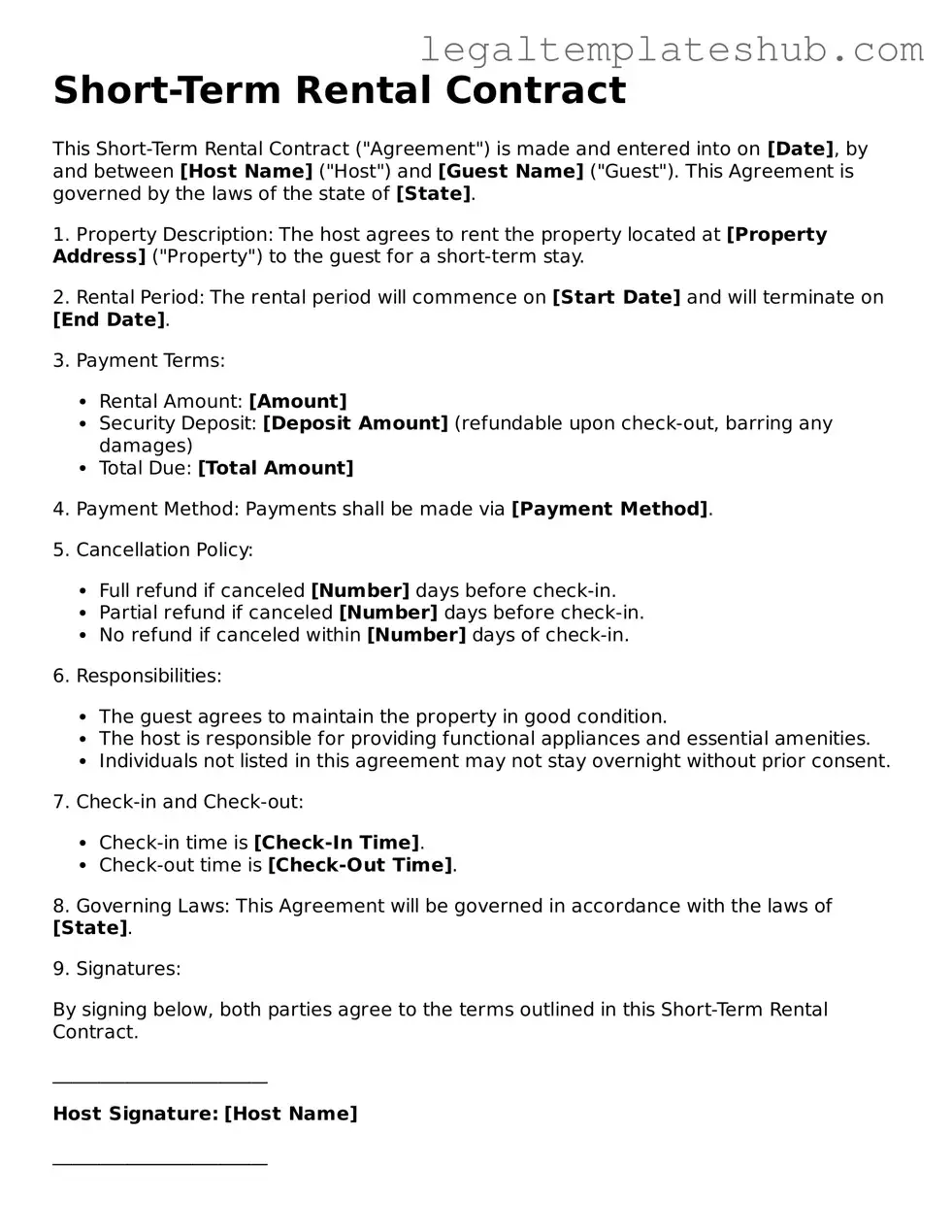Printable Short-Term Rental Contract Template
PDF Form Data
| Fact Name | Description |
|---|---|
| Definition | A Short-Term Rental Contract is a legal agreement between a property owner and a guest for renting a property for a short duration, typically less than 30 days. |
| Governing Law | The contract is governed by state laws, which can vary significantly. For example, in California, it is subject to the California Civil Code. |
| Duration | Short-term rentals usually cover periods ranging from a single night to a few weeks, making them ideal for travelers. |
| Deposit Requirements | Most contracts require a security deposit to cover potential damages or unpaid fees, ensuring protection for the property owner. |
| Cancellation Policies | The contract should outline clear cancellation terms, specifying any fees or deadlines for guests wishing to cancel their reservation. |
| Guest Responsibilities | Guests are typically responsible for maintaining the property during their stay and adhering to any house rules specified in the contract. |
| Legal Recourse | If disputes arise, the contract should specify the legal recourse available, including mediation or court proceedings, depending on state regulations. |
Key takeaways
When filling out and using the Short-Term Rental Contract form, keep these key takeaways in mind:
- Provide Accurate Information: Ensure all details about the property, rental period, and guests are correct. This helps prevent misunderstandings later.
- Read the Terms Carefully: Familiarize yourself with the rental terms, including payment schedules, cancellation policies, and security deposits.
- Signatures Matter: Both the host and the guest should sign the contract. This solidifies the agreement and protects both parties.
- Keep a Copy: After signing, retain a copy of the contract for your records. This can be useful for reference or in case of disputes.
Dos and Don'ts
When filling out the Short-Term Rental Contract form, it is important to follow certain guidelines to ensure accuracy and compliance. Below is a list of things you should and shouldn't do.
- Do read the entire contract carefully before filling it out.
- Do provide accurate personal information, including your name and contact details.
- Do specify the rental dates clearly to avoid any confusion.
- Do review the cancellation policy and understand your rights.
- Don't leave any required fields blank; this may delay the process.
- Don't sign the contract until you fully understand all terms and conditions.
- Don't provide false information; this can lead to legal issues.
- Don't ignore any additional fees that may apply; clarify these beforehand.
Following these guidelines will help ensure a smooth rental experience. Always prioritize clarity and accuracy when completing the form.
Common Types of Short-Term Rental Contract Forms:
Garage Rental Lease - Mentions the consequences of abandoning personal property in the garage.
To facilitate the application process, you may find it helpful to utilize resources such as PDF Templates that provide structured formats for filling out the Rental Application form efficiently and accurately, ensuring you present all necessary information to prospective landlords.
What Is a Non Renewal Notice - Can help in planning future rental property usage.
Sample Rent Increase Letter - Many landlords use a template for a Rent Increase Letter to maintain professionalism.
Instructions on Filling in Short-Term Rental Contract
Completing the Short-Term Rental Contract form is an important step in formalizing an agreement between the property owner and the renter. This process ensures that both parties understand their rights and obligations during the rental period. Follow the steps below to accurately fill out the form.
- Begin by entering the date at the top of the form.
- Provide the names of all parties involved in the rental agreement, including the property owner and the renter.
- Fill in the property address where the rental will take place.
- Specify the rental period, including the start and end dates.
- Indicate the rental amount and any applicable security deposit.
- Outline any rules and regulations that the renter must follow during their stay.
- Include information regarding payment methods and due dates.
- Sign and date the form at the bottom to finalize the agreement.
After completing these steps, both parties should retain a copy of the signed contract for their records. This ensures clarity and accountability throughout the rental period.
Misconceptions
-
Misconception 1: The Short-Term Rental Contract is only necessary for vacation homes.
This is incorrect. The contract is essential for any property rented for a short duration, regardless of its primary use. It provides clear terms that protect both the property owner and the renter.
-
Misconception 2: A verbal agreement is sufficient for short-term rentals.
While verbal agreements may seem convenient, they often lead to misunderstandings. A written contract ensures that all parties have a clear understanding of their rights and responsibilities.
-
Misconception 3: The contract is only about payment terms.
This is misleading. While payment terms are important, the contract also covers issues like security deposits, cancellation policies, and rules regarding property use. It serves as a comprehensive guide for both parties.
-
Misconception 4: The Short-Term Rental Contract is not legally binding.
This is false. A properly executed contract is legally enforceable. It provides a framework for resolving disputes and ensures that both parties adhere to the agreed-upon terms.
